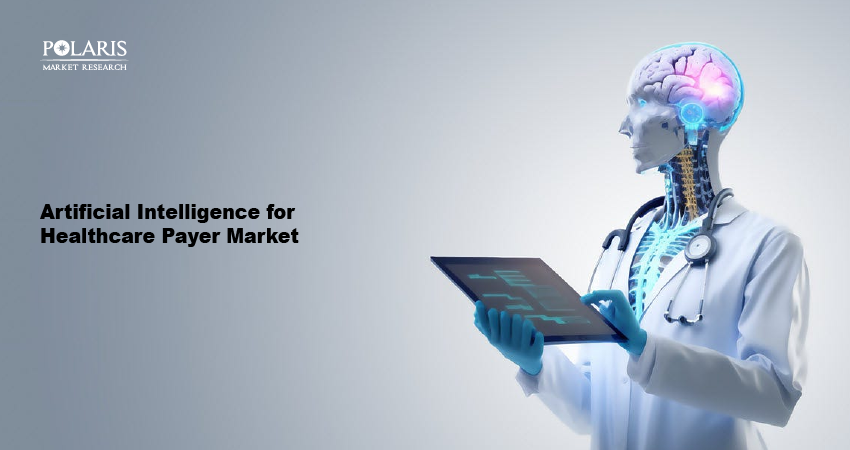Artificial Intelligence For Healthcare Payer Market

Whenever a claim is processed speedily, a coverage query is resolved in an instant, or a tailored recommendation appears in your app, there's more than just convenience on the line. Behind the scenes, intelligent systems are interpreting massive amounts of data, recognizing patterns, and enabling healthcare payers to make quicker, wiser decisions. This is how AI operates unnoticed behind the scenes, changing the way healthcare engages with people.
What is Artificial Intelligence for Healthcare Payers?
Artificial Intelligence for healthcare payers uses intelligent systems and data to streamline and speed up insurance processes. AI assists payers in automatically processing claims, identifying fraud, predicting patient needs, and working more effectively for quicker, more efficient coverage.
Quick Facts
The global artificial intelligence for healthcare payer market size was valued at USD 2.18 billion in 2024 and is expected to grow steadily, reaching approximately USD 9.06 billion by 2034.
Key Technologies Behind AI for Healthcare Payers
Healthcare payers' AI depends on a few robust technologies that simplify operations, enhance decision-making, and deliver better customer experiences. The technologies combine to handle large amounts of data, identify patterns, and execute tasks at optimal levels.
Machine Learning (ML): ML allows systems to learn from historical claims and patient information to anticipate outcomes, identify anomalies, and make more informed decisions over time.
Natural Language Processing (NLP): NLP enables AI to read and interpret unstructured data, such as medical commentary or customer messages, to derive meaningful insights.
Robotic Process Automation (RPA): Solutions from the RPA market automates tasks such as claim acceptance, eligibility verification, and data entry, reducing time and error rates.
Predictive Analytics: The technology leverages historical data to predict future patterns, e.g., identifying at-risk patients or potential fraud cases.
Computer Vision: AI applications can process medical images and scanned documents, helping payers easily verify claims and detect anomalies.
Chatbots and Virtual Assistants: Driven by AI, they provide real-time customer service, answer questions, and guide users through insurance activities independently.
Decision Support Systems: Use AI to suggest optimal courses of action for payers, enhancing operational effectiveness and policyholder satisfaction.
Benefits of AI for Healthcare Payers
AI is transforming healthcare payers through accelerated processes, enhanced accuracy and efficiency, and facilitating improved outcomes. Its major benefits are:
Faster Claims Processing
AI can automate time-consuming activities such as claim approval and review, substantially reducing turnaround times. Policyholders get quicker reimbursements and replies, and payers can handle more volumes without adding headcount.
Fraud Detection and Risk Management
Intelligent systems can detect unusual patterns or suspicious claims that may indicate fraud. By analyzing past trends and forecasting threats, AI enables payers to reduce losses and improve the accuracy of claim processing.
Improved Customer Experience
AI-powered chatbots and virtual assistants from the intelligent virtual assistant market can respond to policyholder queries in real time, provide personalized advice, and guide customers through complex procedures.
Operational Efficiency
By automating mundane tasks and optimizing processes, AI saves manual effort and human error. Payers can maximize resources, reduce operational expenses, and reserve staff for more strategic tasks.
Data-Driven Decision Making
AI analyzes large datasets to reveal patient behavior, claim trends, and coverage requirements. This enables payers to make more informed, evidence-based choices, craft superior plans, and enhance overall performance.
How is AI Transforming the Healthcare Payer Market?
- AI speeds up claims processing and approval, reducing waiting time for policyholders.
- It reduces errors and manual effort, allowing workers to focus on urgent tasks.
- AI identifies fraud and alerts on suspicious claims before they become expensive problems.
- AI assumes patient needs and high-risk cases, enabling payers to better plan coverage.
- AI improves customer service by enabling virtual assistants and chatbots to provide real-time support.
- AI reduces operational costs and enhances efficiency through process optimization and automation.
What's Next for AI in Healthcare Payers?
AI will make healthcare payers faster, smarter, and more efficient. Claims processing and fraud detection will be more efficient, routine tasks will be automated, plans will be personalized, and real-time insights from devices will enable payers to serve policyholders better, save money, and focus on patient-centered care.
In Closure
AI is quietly revolutionizing the healthcare payer industry, speeding up processes and making them wiser and more effective. From claims processing automation and fraud detection to patient demand forecasting and customer service enhancement, AI empowers payers to provide better service while reducing costs and errors. With emerging technology, AI will increasingly shape a more streamlined, data-oriented, and patient-centered healthcare experience, setting the stage for an even smarter, more responsive future.

